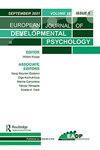Longitudinal antecedents and consequences of ethnic, cyber and offline victimization
IF 1.9
4区 心理学
Q3 PSYCHOLOGY, DEVELOPMENTAL
European Journal of Developmental Psychology
Pub Date : 2023-10-22
DOI:10.1080/17405629.2023.2271209
引用次数: 0
Abstract
ABSTRACTTaking a socio-ecological theoretical perspective, the present study (1) examined the concurrent and longitudinal associations between offline, cyber, and ethnic victimization, and (2) investigated whether the same or different intra- and interpersonal variables are longitudinal risk or protective factors. A three-wave longitudinal study including 630 adolescents (50% boys, 12.52 years at wave 1, 7% first and 14% second generation immigrant) was utilized. Cross lagged panel models showed that neither offline victimization nor cyber victimization predicted ethnic victimization longitudinally. Positive peer relations, good class climate, high levels of school bonding, high levels of school motivation and high levels of self-efficacy at the beginning of grade 7 were protective factors for low levels of ethnic, cyber, and offline victimization at the end of grade 7. However, only high levels of ethnic victimization at the beginning of grade 7 were also risk factors for low levels of positive peer relations, school bonding and school motivation at the end of grade 7. Ethnic victimization at the end of grade 8 could not be predicted prospectively. Considering its unique negative consequences within grade 7, it is important to give ethnic victimization a special attention in anti-bullying programs.KEYWORDS: Ethnic victimizationoffline victimizationcyber victimizationcross-lagged panel modeladolescence AcknowledgmentsWe would like to thank Dr. Rainer Schmidbauer and the students of the master programme “Addiction and violence prevention in educational settings” (University of Education Upper Austria, Linz) for their invaluable support in realizing this study. We are very grateful to the schools and teachers who participated in this study.Disclosure statementNo potential conflict of interest was reported by the author(s).Data availability statementThe data is available from the first author upon request.Ethics approval statementWe declare that the study was conducted according to the 1964 Helsinki declaration and its later amendments.Additional informationFundingThe writing of the present study has been supported by the Oesterrreichische Nationalbank Anniversary Fund, project number 18734.种族、网络和线下受害的纵向前因后果
摘要本研究从社会生态学的角度出发,(1)考察了线下、网络和种族受害之间的并行和纵向关联;(2)研究了相同或不同的内部和人际变量是纵向风险因素还是保护性因素。采用三波纵向研究,包括630名青少年(50%为男孩,12.52岁,第1波为7%,第2代移民为14%)。交叉滞后面板模型显示,线下受害和网络受害都不能纵向预测种族受害。积极的同伴关系、良好的班级气氛、高水平的学校联系、高水平的学校动机和高水平的自我效能感是七年级末低水平的种族、网络和线下受害的保护因素。然而,只有在七年级开始时高水平的种族受害也是七年级结束时低水平的积极同伴关系,学校联系和学校动机的危险因素。八年级结束时的种族受害无法预测。考虑到它在七年级中独特的负面影响,在反欺凌计划中给予种族受害者特别关注是很重要的。致谢致谢致谢致谢致谢致谢致谢致谢致谢致谢致谢致谢致谢致谢致谢致谢致谢致谢致谢致谢致谢致谢致谢致谢致谢致谢致谢致谢致谢致谢致谢致谢致谢致谢致谢致谢致谢致谢致谢致谢致谢致谢致谢致谢致谢致谢致谢致谢致谢致谢致谢致谢致谢致谢致谢致谢致谢致谢致谢致谢致谢致谢致谢致谢致谢致谢致谢致谢致谢致谢致谢致谢致谢致谢致谢致谢致谢致谢致谢致谢致谢致谢致谢致谢致谢致谢致谢致谢致谢致谢致谢致谢致谢致谢致谢致谢致谢致谢致谢致谢致谢致谢致谢致谢致谢致谢致谢致谢致谢致谢致谢致谢致谢致谢致谢致谢致谢致谢致谢致谢致谢致谢致谢致谢致谢致谢致谢致谢致谢致谢致谢致谢致谢致谢致谢致谢致谢致谢致谢致谢致谢致谢致谢致谢致谢致谢我们非常感谢参与这项研究的学校和老师。披露声明作者未报告潜在的利益冲突。数据可用性声明数据可根据要求从第一作者处获得。伦理批准声明我们声明这项研究是根据1964年赫尔辛基宣言及其后来的修正案进行的。本研究的写作得到了Oesterrreichische Nationalbank周年纪念基金的支持,项目编号18734。
本文章由计算机程序翻译,如有差异,请以英文原文为准。
求助全文
约1分钟内获得全文
求助全文
来源期刊

European Journal of Developmental Psychology
PSYCHOLOGY, DEVELOPMENTAL-
CiteScore
3.70
自引率
0.00%
发文量
35
 求助内容:
求助内容: 应助结果提醒方式:
应助结果提醒方式:


